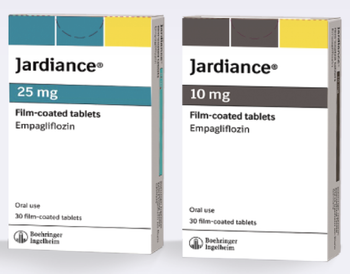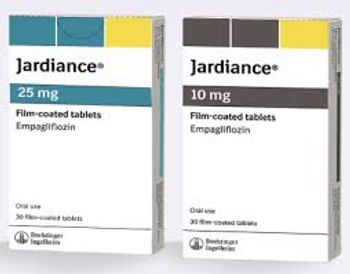
Diabetes
Latest News

The agency said this was the first such approval, as the purified omega-3 fatty acid is now approved to be used alongside statins to treat elevated cholesterol levels and cut the risk of events such as heart attacks or strokes. The drug was first approved in 2012 for patients with elevated triglycerides.
Latest Videos

CME Content
More News

The findings from researchers at The Centers for Disease Control and Prevention (CDC) highlight the public health risks of obesity and type 2 diabetes, which have been tied to recent studies that find rising deaths from heart failure and even an overall drop in US life expectancy, with the long-term rise in obesity playing a role in the decline.

A high-tech drug testing machine is being utilized to detect fentanyl in illicit drugs; the Massachusetts governor enacts a stingent vaping flavor ban; data on blood-sugar levels for patients with diabetes using Dexcom's continuous glucose monitor (CGM) has been unavailable since Saturday.

The findings have important implications, the authors wrote, as the study confirms “the potential clinical utility of empagliflozin for the treatment of obesity and related metabolic disorders, such as insulin resistance, type 2 diabetes, and [nonalcoholic steatohepatitis."

Three straight years of declining life expectancy—from 2014 to 2017—have roots that go back to the 1980s, when the authors say US life expectancy began to lose pace with other countries.

Humana outlined its progress in its third annual Value-Based Care Report, which details growth and evolution in this area since 2016, both in the number of agreements and in its spread across more parts of the country.

EMPRISE (Empagliflozin Comparative Effectiveness and Safety) will examine 5 years of real-world data on empagliflozin, which is sold as Jardiance by Eli Lilly and Boehringer Ingelheim. The study is comparing data on empagliflozin with that for dipeptidyl peptidase 4 (DPP-4) inhibitors. This latest interim analysis also features a cohort comparison with glucagon-like peptide 1 (GLP-1) receptor agonists.

The pioglitazone safety warning issued in South Korea, which recommended prescribing with careful attention among those with high risk of bladder cancer, led to a moderate decrease in pioglitazone users.

This week, the top managed care news included Medicaid tightening the reins on supplemental payments; employers needing more data to control benefit costs; experts saying prior authorization mostly burdens patients.

Chronic disease affects most employees in the United States, and today, on World Diabetes Day, Managed Care Cast speaks with the lead author of a study about chronic disease that will appear in the November issue of The American Journal of Managed Care®. Author Maren S. Fragala, PhD, CSCS.D, talks about how employer-sponsored health screenings can help identifiy previously undiagnosed disease, enabling early detection and treatment, and help keep workers healthier.

Solera announced this week that the company has expanded its relationship with Blue Mesa Health to offer a Spanish-language Diabetes Prevention Program (DPP) Transformemos as a covered California Medicaid (Medi-Cal) member benefit.

Every week, The American Journal of Managed Care® recaps the top managed care news of the week, and you can now listen to it on our podcast, Managed Care Cast.

Patients with diabetes who participated in a program of group medical visits (GMVs) and intensive weight management showed improvements in glycemic control, according to a study published in JAMA Internal Medicine.

This week, the top managed care news included CMS started planning for life after the Oncology Care Model; a judge blocked a rule requiring immigrants to have health coverage; Election Day brought news for Medicaid work rules.

Oral semgalutide’s price, along with its potential for adverse events, caused ICER to give empagliflozin the edge in cost effectiveness as physicians and health plans evaluate which type 2 diabetes therapy should be given after metformin.

This week, the top managed care stories included a report from the FDA considering how to avoid drug shortages; a white paper finds rising comfort with telehealth even as use of digital health tools stagnates; data show a spike in the number of uninsured children.

Rising rates of obesity and diabetes have raised concerns that more people could be headed for end-stage renal disease (ESRD); thus, Medicare has been seeking ways to reduce the cost of care and to improve the quality of life for people on dialysis. Scientists are focusing on whether more patients with early-stage type 2 diabetes should take sodium glucose co-transporter 2 inhibitors, which have been shown to slow renal decline.

The 19 signers of the letter to HHS Secretary Alex Azar and CMS Administrator Seema Verma include Senate Finance Committee members and lawmakers from states with high rates of diabetes and obesity.

Every week, The American Journal of Managed Care® recaps the top managed care news of the week, and you can now listen to it on our podcast, Managed Care Cast.

A CDC report said that, overall, fentanyl continues to drive drug overdose deaths, but in almost half of the country, methamphetamine is the leading killer; backers of Medicaid expansion in Oklahoma said they submitted more than enough signatures to get the measure on the ballot in 2020; the Federal Trade Commission is suing publishers of "The Doctor's Guide to Reversing Diabetes in 28 Days" on the grounds that they are falsely promising a cure without dietary changes or exercise and stating that those changes will make diabetes worse.

This week, the top managed care news included the average Affordable Care Act premiums falling 4%; the FDA approving a triple combination treatment for cystic fibrosis; House Republicans releasing part 1 of their healthcare plan.

The advantage of empagliflozin, and the sodium glucose cotransporter 2 class generally, is that its unique mechanism expels excess glucose through the urine, thus offering the possibility of reducing glucose variability—eliminating the “roller coaster” effect that many with type 1 diabetes experience that can cause long-term microvascular damage.

Black patients with diabetes may have a significantly higher risk of readmission to hospitals than other ethnic and racial minorities due to the high burden and complications of the disease, according to research published in JAMA Network Open.

Omada Health, a longtime leader in digital health coaching for diabetes prevention and type 2 diabetes (T2D) care, and Abbott, maker of the FreeStyle Libre, said the partnership will “create a new paradigm” in T2D management.

The authors say their findings align with other analyses showing the cost-effectiveness of sodium glucose co-transporter 2 (SGLT2) inhibitors.

Federal judges denied a Trump administration proposal to deny green cards to immigrants requiring public benefits; researchers aim to develop a test to assess hereditary diabetes risk; vaping-related deaths rise to 29 nationwide.
















